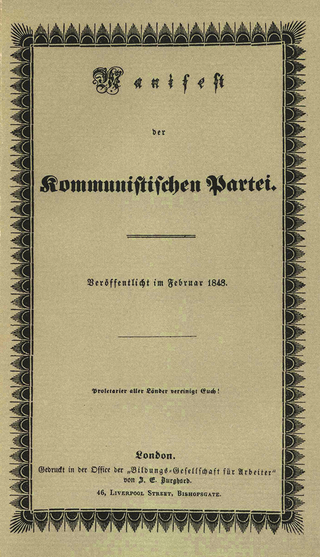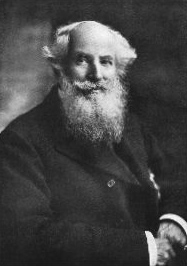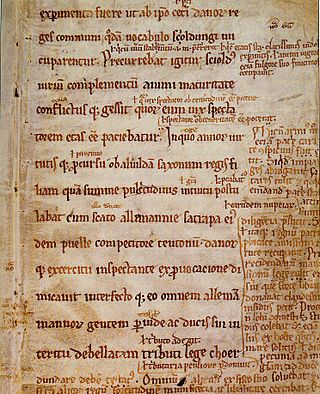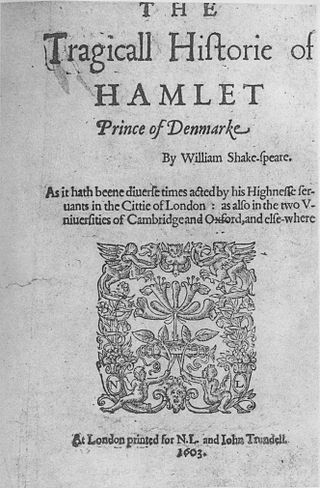Related Research Articles

The Oxfordian theory of Shakespeare authorship contends that Edward de Vere, 17th Earl of Oxford, wrote the plays and poems of William Shakespeare. While historians and literary scholars overwhelmingly reject alternative authorship candidates, including Oxford, public interest in the Oxfordian theory continues. After the 1920s, the Oxfordian theory became the most popular alternative Shakespeare authorship theory.

The Communist Manifesto, originally the Manifesto of the Communist Party, is a political pamphlet written by Karl Marx and Friedrich Engels, commissioned by the Communist League and originally published in London in 1848. The text is the first and most systematic attempt by Marx and Engels to codify for wide consumption the historical materialist idea that "the history of all hitherto existing society is the history of class struggles", in which social classes are defined by the relationship of people to the means of production. Published amid the Revolutions of 1848 in Europe, the manifesto remains one of the world's most influential political documents.

Frederick James Furnivall was an English philologist, best known as one of the co-creators of the New English Dictionary. He founded a number of learned societies on early English literature and made pioneering and massive editorial contributions to the subject, of which the most notable was his parallel text edition of The Canterbury Tales. He was one of the founders of and teachers at the London Working Men's College and a lifelong campaigner against injustice.
Sir Frederic Madden KH was an English palaeographer.

Edward Dowden was an Irish critic, professor, and poet.
Henry Willobie is the ostensible author of a 1594 verse novella called Willobie His Avisa, a work that is of interest primarily because of its possible connection with William Shakespeare's life and writings.

Horace Howard Furness was an American Shakespearean scholar of the 19th century.
Clement Mansfield Ingleby was an English Shakespearian scholar.

The Baconian theory of Shakespearean authorship contends that Sir Francis Bacon, philosopher, essayist and scientist, wrote the plays that are publicly attributed to William Shakespeare. Various explanations are offered for this alleged subterfuge, most commonly that Bacon's rise to high office might have been hindered if it became known that he wrote plays for the public stage. The plays are credited to Shakespeare, who, supporters of the theory claim, was merely a front to shield the identity of Bacon. All but a few academic Shakespeare scholars reject the arguments for Bacon authorship, as well as those for all other alternative authors.
Frederick Gard Fleay was an influential and prolific nineteenth-century Shakespeare scholar.

A text publication society is a learned society which publishes scholarly editions of old works of historical or literary interest, or archival documents. In addition to full texts, a text publication society may publish translations, calendars and indexes.

The sources of Hamlet, Prince of Denmark, a tragedy by William Shakespeare believed to have been written between 1599 and 1601, trace back as far as pre-13th century. The generic "hero-as-fool" story is so old and is expressed in the literature of so many cultures that scholars have hypothesized that it may be Indo-European in origin. A Scandinavian version of the story of Hamlet was put into writing around 1200 AD by Danish historian Saxo Grammaticus in his work Gesta Danorum. It is from this work that Shakespeare borrowed to create Hamlet. Similar accounts are found in the Icelandic Saga of Hrolf Kraki and the Roman legend of Lucius Junius Brutus, both of which feature heroes who pretend to be insane in order to get revenge. A reasonably accurate version of Saxo's story was translated into French in 1570 by François de Belleforest in his Histoires Tragiques. Belleforest embellished Saxo's text substantially, almost doubling its length, and introduced the hero's melancholy.
Thomas Duffet, or Duffett, was an Irish playwright and songwriter active in England in the 1670s. He is remembered for his popular songs and his burlesques of the serious plays of John Dryden, Thomas Shadwell, Elkanah Settle and Sir William Davenant.

The Mock Tempest, or the Enchanted Castle is a Restoration era stage play, a parody by Thomas Duffet; it premiered in 1674, and was first printed in 1675 by the bookseller William Cademan. In creating his farce, Duffet's target was not Shakespeare's famous play, but the adaptation of it that John Dryden and Sir William Davenant wrote in the 1660s. According to critic Michael West, "There are frequent nautical metaphors, and 'more noyse and terrour than a Tempest at Sea'...."

Q1 of Hamlet is a short early text of the Shakespearean play. The intended publication of the play is entered in the Stationers' Register in 1602 by James Roberts, but Q1 was not published until summer or autumn 1603. It was published by the booksellers Nicholas Ling and John Trundle, and printed by Valentine Simmes. Roberts later printed the "Second Quarto" (Q2).

The spelling of William Shakespeare's name has varied over time. It was not consistently spelled any single way during his lifetime, in manuscript or in printed form. After his death the name was spelled variously by editors of his work, and the spelling was not fixed until well into the 20th century.

The Shakespeare authorship question is the argument that someone other than William Shakespeare of Stratford-upon-Avon wrote the works attributed to him. Anti-Stratfordians—a collective term for adherents of the various alternative-authorship theories—believe that Shakespeare of Stratford was a front to shield the identity of the real author or authors, who for some reason—usually social rank, state security, or gender—did not want or could not accept public credit. Although the idea has attracted much public interest, all but a few Shakespeare scholars and literary historians consider it a fringe theory, and for the most part acknowledge it only to rebut or disparage the claims.
Teena Rochfort-Smith was a Victorian Shakespearean scholar and philologist most notable for her contributions to the form of the scholarly edition.
Samuel Neil (1825–1901) was a Scottish schoolteacher, journalist and author.
Bolton Corney (1784–1870) was an English army officer and official, known as a critic and antiquary.
References
- 1 2 You are invited to join the New Shakspere Society. 1873. Retrieved 13 May 2016.
- 1 2 3 4 Mark Hollingsworth (2012). Marshall, Gail (ed.). Shakespeare in the Nineteenth Century. Cambridge University Press. p. 441. ISBN 9780521518246.
- ↑ Gabriel, Mary. Love and Capital: Karl and Jenny Marx. New York: Little Brown. 2011. p467
- ↑ Thompson, Ann (Summer 1998). "Teena Rochfort Smith, Frederick Furnivall, and the New Shakespere Society's Four-Text Edition of Hamlet". Shakespeare Quarterly. 49 (2): 125–139. doi:10.2307/2902297. JSTOR 2902297.
- ↑ Shakspere Allusion Books Part I. 1874. Retrieved 16 September 2023.
- ↑ The succession of Shakespere's works and the use of metrical tests in settling it. 1874. Retrieved 16 September 2023.